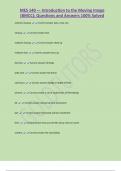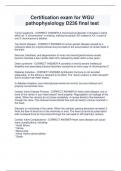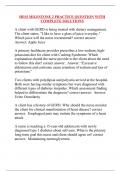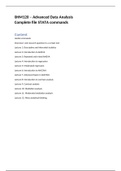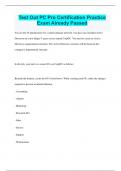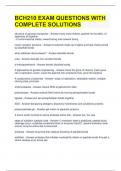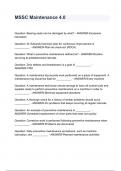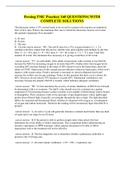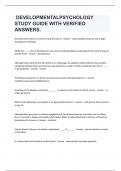Retrieval
Sensory
register Short-term Long-term
• Developed by Atkinson & Shiffrin (1968) • Iconic memory Prolonged memory • A model of short -term memory developed by Baddeley & Hitch (1974)
• Echoic rehearsal
• Theoretical model that views memory as information flowing through a • Aimed to explain aspects of memory which weren’t accounted for by the multi sto
series of storage systems
Response Working memory model (WMM) Episodic buffer (EB)
Long-term memory (LTM) Short-term memory (STM) An explanation of how one aspect of The third slave system added to the model b
The potentially permanent Limited-capacity memory system, this means Maintenance memory (short-term) is organised a temporary store for information, integratin
store for information that it can only store 7 ± 2 items. Information in
rehearsal and how it functions. and verbal information processed by other s
has been rehearsed for a STM is coded acoustically and has a duration The WMM is concerned with the a sense of time sequencing —basically recor
prolonged period of time. of about 30 seconds unless part of the mind that is active when that are happening. it can be seen as the sto
+ Supporting research
It's capacity is believed to rehearsed. Maintenance rehearsal will let the we are temporarily storing and central executive and has a limited capacity
The multi store model is supported by research that shows STM & LTM are
be unlimited and duration information pass into long-term memory. manipulating information, for (Baddeley 2012). The episodic buffer links w
qualitatively different. E.g. Baddeley found that we tend to mix up words that sound
can be for many example when working on an and wider cognitive processes such as perce
similar when using our STM, but we mix up words with similar meanings when using
years. Bahrick et al Sensory register (SR) arithmetic problem or playing chess
LTM. This suggests they have different encoding systems and must be seperate and
(1975) found that pp's or comprehending language, etc. Central executive (CE
Sensory information from the environment is independent, as in the MSM.
could still recognise their The model consists of four main The central executive is essentially an attent
held here very briefly (< 0.5 second). There is
classmates 50 years later. components, each of which is monitors incoming data, makes decisions an
a sensory register for each of our senses
LTMs tend to be - More than one type of STM qualitatively different especially in systems to tasks. The central executive has a
(sight, sound, etc), but the main ones
coded semantically. When The MSM describes the short-term memory as a single store. However, we know from terms of capacity and coding. processing capacity
are iconic (visual) and echoic (auditory).
we want to recall a While the duration is very low, research such as Shallice & Warrington (1970) that this is not true. They found that
memory from LTM, it has the capacity for information is very high. patients suffering from amnesia had different levels of recall for visual and auditory
Phonological loop (PL)
to be sent to STM in a Information will only pass further into the information, suggesting there are at least 2 separate stores for these. This means the
process called retrieval. MSM may be less comprehensive and valid. (One of the slave systems is the phonological loop (PL). It
memory system if you pay attention to it.
deals with auditory information (i.e. coding is acoustic) and
preserves the order in which the information arrives. The
- More than one type of rehearsal PL is subdivided into:
Explanations for forgetting The MSM suggests there is only one type of rehearsal, and the most important thing to • Primary acoustic store: which stores the words you
Phonological loo
•
Interference
Primary acoustic
the amount of rehearsal that you do. However, Craik & Watkins (1973) suggested that hear. store (PAS)
what really matters is the type of rehearsal. Maintenance rehearsal only maintains • Articulatory process: which allows maintenance • Articulatory pro
information in STM, while elaborative rehearsal (not described by MSM) is needed for rehearsal (repeating sounds or words in a ‘loop’ to keep
• Interference is one of the theories that explains how and why memories
long-term storage. This is another limitation of the MSM because it's another research them in working memory while they are needed). The
are forgotten from long term-memory
finding that cannot be explained. capacity of this ‘loop’ is believed to be two seconds’
worth of what you can say.
Interference + Real life studies
Fa
A LEVEL PSYCHOLOGY
Interference is when one memory affects another, causing them both to Some studies have attempted
be distorted or forgotten. This explanation is generally associated with to study interference in a more
long-term memory. realistic context. Baddeley &
Proactive interference is when older memories, already stored, disrupt Hitch (1977) asked rugby
the recall of new memories. The degree of forgetting increases when the
memories are similar.
players to recall as many teams
they’d played as they could.
Memory knowledge organiser -
Retroactive interference is when newer memories disrupt the recall of They found that the number of Johnson & Sc
old, existing memories. Again, the degree of forgetting increases when games played would cause surprise rath
Positive effect on recall because they
the memories are similar. forgetting more than the Explanations for forgetting The stress of witnessing a crime or accident creates anxiety, which scared. Picke
amount of time between
McGeoch and McDonald (1931) studied retroactive interference. They games. This study has higher
ecological validity and supports
Retrieval failure triggers the fight or flight response. This increases our alertness which
may make us more aware of cues around us, meaning we have a better
is significantl
This means w
asked pp’s to learn a list of 10 words until they could recall with 100%
interference theory. memory of the event. anxiety speci
accuracy. Then they were split into 6 groups and given a second word list, • Retrieval failure is the other theory that seeks
Yuille & Cutshall (1986) interviewed witnesses’ to a real life fatal shooting.
with varying similarity to the first. to explain why memories cannot always be
They found that after being interviewed again 4-5 months later, there
When the pp’s were asked again to recall the first list, their performance - Artificial task accessed from long-term memory was only a slight drop in accuracy. Witnesses’ stress levels were Researchers
depended on the nature of the second list. The groups that had a similar Most of the lab experiments assessed using a 7 point scale and if they experienced emotional issues after the eve
second list struggled more to recall the first, suggesting there was asked participants to recall a or insomnia. things happe
interference. list of words. This is an artificial + Supporting research The results showed that witnesses’ with higher stress levels were more control (e.g. p
task compared to the things we Multiple studies support the theory of retrieval accurate than those with lower stress. confounding
+ Lab studies remember in real life (people’s failure (e.g. Carter & Cassaday (1998) and
Thousands of lab studies (e.g. McGeoch & McDonald) into interference faces, birthdays, etc) so the Godden & Baddeley (1975)). This gives the theory Negative effect on recall
have shown that both types of interference are common ways we forget. studies could lack ecological validity because studies have demonstrated
The anxiety created by witnessing a crime or accident may stop us from


